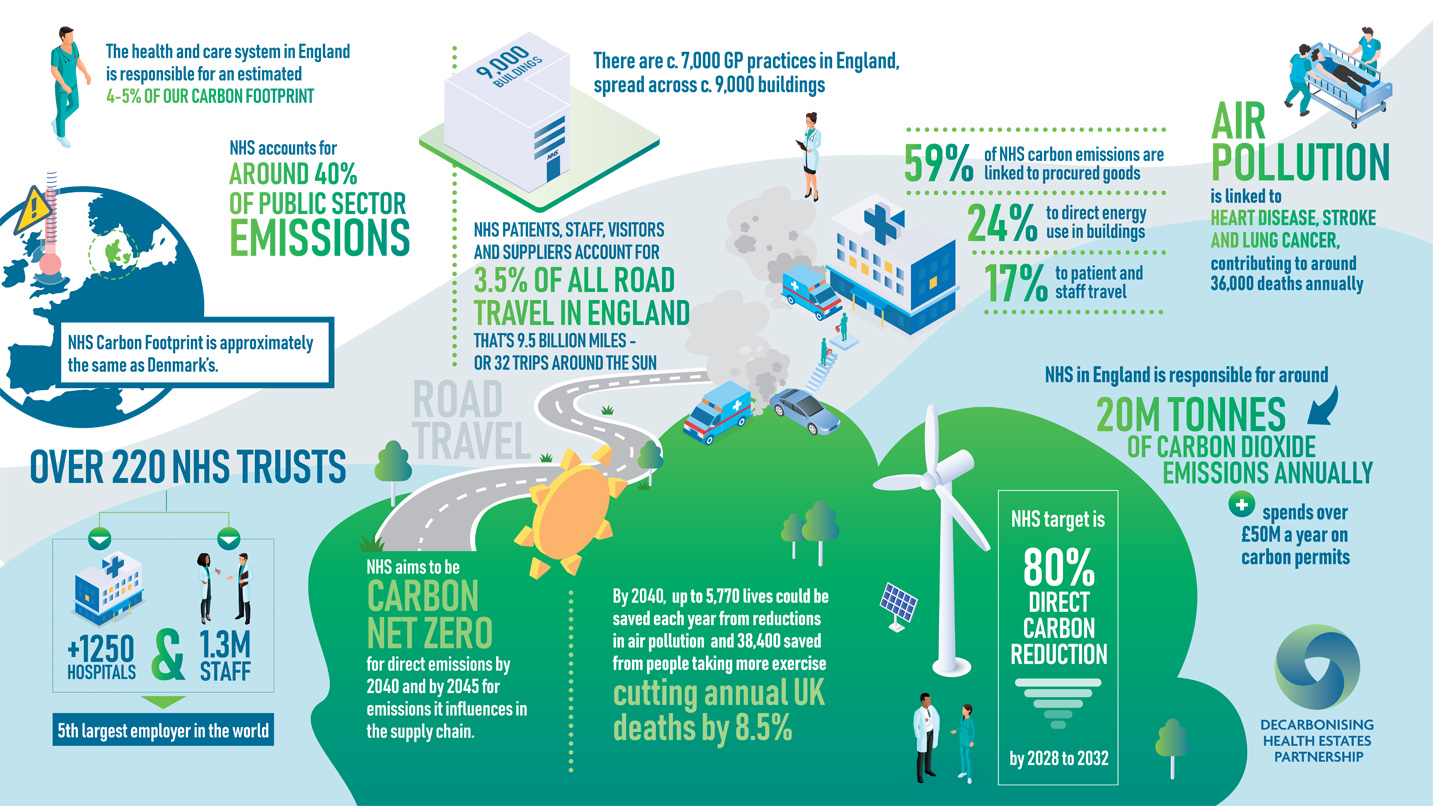
A new partnership to support NHS Trusts in developing and implementing their decarbonisation strategies launches, as senior NHS leaders argue that decarbonising the NHS estate is “fundamentally not complex”, but more data and greater guidance is needed.
Led by the Wates Group — the UK’s leading family-owned construction and property services business — alongside a multi-disciplinary team of built environment specialists, including Arup and HKS Architects, the Decarbonising Health Estates Partnership (DHEP) will work to drive forward sustainability within hospital infrastructure, focusing on existing NHS estates. This comes as NHS England publishes its Net Zero Carbon Delivery Plan later this month.
The partnership was soft launched as part of a roundtable, chaired by former Secretary of State for Health and Chair of the NHS Confederation, Rt Hon Stephen Dorrell, on 12th October. Speaking at the event, representatives from NHS England as well as local NHS Trusts maintained that at their core hospitals are “another place where people gather” — like restaurants and hotels — and that the health sector should be taking lessons from other industries as it works towards the NHS’ goal to reach net zero carbon emissions under its direct control by 2040.
The NHS is the most significant public sector contributor to climate change in the UK, representing more than 5% of the UK’s total carbon footprint, equivalent to the greenhouse gas emissions of 11 coal-fired power stations. The existing NHS estate and its supporting facilities services comprise 15% of the total carbon emissions profile. The roundtable highlighted the need for Trusts to invest in data collection and share experiences to understand what changes will have the most impact and ensure they are getting the “biggest bang for their buck”, with one attendee noting that organisations will need to be prepared to have increased operational costs if they want to reduce their emissions. It also explored the opportunity for NHS Trusts to act as sustainability leaders in their local communities, for example using their vast buying power to influence the behaviours of local suppliers to minimise their carbon footprint.
DHEP will use its expertise to develop bespoke solutions for NHS Trusts, helping them to find cost-effective solutions to reduce Scope 1 and 3 emissions in infrastructure ranging from whole estates to individual buildings. It will focus on delivering progress through improvements in the built environment, such as building fabric and building services systems, as well as helping trusts to identify what information and data is required to undergo this work.
Bonnie Chu, Healthcare Design Director at Wates Group, said: “Existing NHS estates are more challenging to decarbonise than new-build facilities and will be crucial in helping the NHS reach their ambitious net zero targets. As an industry however, we need to take a step back and take a holistic approach to simplify the opportunities available, using our experiences from other sectors — be that hospitality through to education — and applying them to a healthcare setting. This exciting new partnership aims to actively work with Trusts to develop solutions which can transform their estates so that they are sustainable and fit for a net zero future.”
Mike Booth, Director and Healthcare Business Lead at Arup, commented: “Work undertaken to identify and address carbon emissions across the NHS has highlighted the challenges existing healthcare facilities face. Significant maintenance issues, historic infrastructure and buildings and a lack of capital all hamper the NHS’s net zero carbon ambition. At Arup we bring together consultancy and design expertise to produce highly sustainable environments for clients across all sectors. We are thrilled to be part of this new partnership, working with Trusts to overcome these challenges and take effective, efficient, steps towards decarbonisation.”
Paul Sawyers, Principal and Director of Health at HKS Architects, added: “While designing new sustainable hospitals for the future is extremely important, given the sheer quantity of existing hospitals, decarbonising these has to be a priority to reach net zero targets — but it does present a huge challenge. The creation of this partnership has helped everyone vastly expand their knowledge and understand, holistically, the issues involved; I am excited to be part of this dynamic team, driving forward the agenda to decarbonise health estates. Of course, the hospital buildings themselves are only part of the story, but making up around a quarter of NHS carbon output, it’s a really key element. I look forward to continue working as part of this partnership, to deliver a more sustainable future that still puts patient experience front and centre.”
A white paper exploring the decarbonisation of NHS estates will be developed in follow up to the event. Those working in the industry are invited to share their views by contacting: dhep@wates.co.uk








